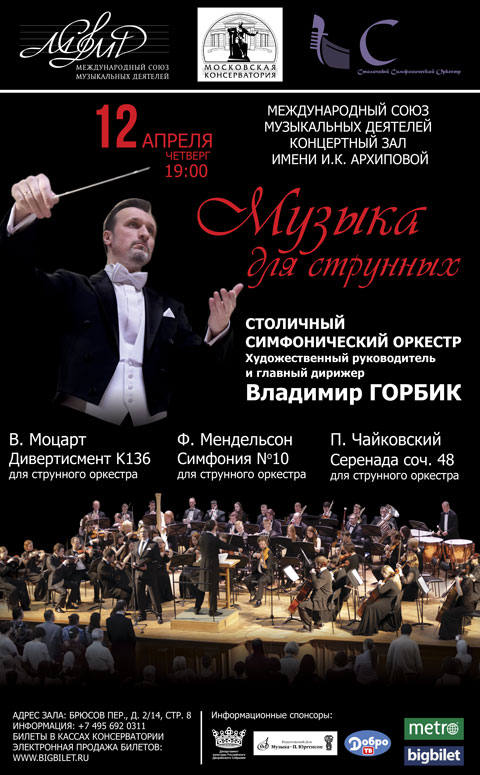ARKHIPOV HALL OF IUMF
"MUSIC FOR STRINGS"
April 12, 2018

American musician about the Capital Symphony Orchestra
On the 12th of April, 2018, in Moscow’s Irina Konstantinovna Arkhipova Concert Hall at the Internation Union of Musical Figures, the recently formed Capital Symphony Orchestra under the direction of Maestro Vladimir Gorbik, performed a three-composition concert, which I listened.
Called “Music for Strings”, the concert program put on display three very fine works for string orchestra: The Divertimento for String Orchestra, composed by Wolfgang Amadeus Mozart (K.136), the Tenth Symphony for String Orchestra by Felix Mendelssohn, and the inimitable Serenade for Strings by Peter Ilyich Tchaikovsky, Opus 48.
The Arkhipova Concert Hall is an intimate setting that makes it easy to hear all the detail of the orchestra, up close and personal. In such a setting, any discontinuity in the ensemble is easy to pick out. Players here must be exacting in their attentiveness to the conductor and to their music to be able to present any material beautifully.
The listeners were not disappointed. This one-hour concert treated the audience to a fantastic cross-section of string-based symphonic music, and even the close and intimate atmosphere was not able to uncover anything but flawless musicianship.
As a choirmaster myself, I learned that the best way to ensure the quality of an ensemble is to have them sing or play in a room that offers no “enhancement” to the sound in any way. For a church choir, echo is a blessing in this because it can diffuse the sound and create reflections that sound far more pleasant than the original sound of the choir. However with an ensemble of instrumentalists, this phenomenon is not desired. That being said, a large concert hall still provides opportunity for the instruments to mix in a pleasant way that can cover slight errors made by individual players. But here, there were no errors to hear at all.
The treatment of Mozart’s Divertimento was such that the listener might well be hearing the master composer himself conduct this work. Some modern recordings of this piece feature tempo changes, presumably to add emotion and “fire” to the composition, but Maestro Gorbik channeled the spirit of the composer and his time in a more authentic fashion, keeping the tempo rock-steady. In this way the movement of the piece was kept
as the pulse by which the amazing, almost baroque ostinati of the lead strings comes alive in all its intended beauty.
An interesting feature of this compostion is that unlike other Divertimenti composed by Mozart, this one is only for strings. It therefore places much demand on the ability of this one type of instrument to convey a musical message in a variety of ways. Maestro Gorbik executed this with smoothness and in this approach, the music, and not the conductor, was able to take pre-eminence in the performance.
This same quality of authenticity was repeated in the performance of Felix Mendelssohn’s Tenth Symphony for String Orchestra. The ability of the lower strings to emulate timpani was striking here, and the gentle emotion of the piece stands as a very different character than the most directed intensity of Mozart. Maestro Gorbik evoked a quiet and peaceful character for this piece without letting it submit to lethargy. In the more allegro section into the piece the same peace is maintained under all things, even as the music becomes very energetic.
The Tchaikovsky Serenade for Strings came next, and it was delightful. From the majestic beginning, the ensemble was wonderfully evocative of the romantic style that Tchaikovsky is so famous the world over for. As the serenade moved through its three movements, Maestro Gorbik evoked, again, not himself and his will in conducting, but rather the heart and soul of the composer himself. For the audience, the Serenade was not a conductor’s performance of someone else’s composition, it was as if the composer himself was there, telling and showing the audience his own heart, soul and thought in every phrase of the music.
This was evident especially at the end of the concert. The audience received this whole concert with astounding joy, and the Capital Symphony Orchestra and its conductor were given resounding applause, a very long standing ovation and especially, the synchronized clapping that, for the Russian soul, signifies the highest form of praise. This went on and on for an unusually long time.
The Capital Symphony Orchestra seeks to bring the great works of classical composers to life in a manner just like what we heard tonight. The ability of Maestro Vladimir Gorbik to become “invisible” as an interpretive force, but rather to allow himself to become the window through which the spirit of the past shines through to our times, as it was intended, is one of the great hallmarks of this Orchestra. Once again we saw and heard this miracle take place. There is every reason to believe that this group will shine as a humble, but very significant star, over the Russian and international musical landscape.
Aaron Seth Hanisch

